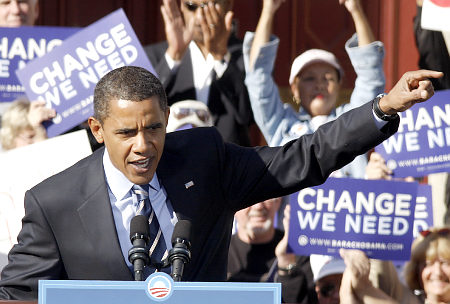Obama's Surprisingly Big Base

The downgrade of the national debt, sagging approval ratings and better poll numbers for Mitt Romney are giving many Republicans hope for a victory in the 2012 elections. Given the inherent differences between elections, I wouldn’t count on current polls or anything else (including what I’m about to write) as a sure predictor of presidential elections.
Here’s an interesting data point however: Obama’s approval rating lows, to date, are higher than those for any President since Kennedy.
I’d suggest that this is a reasonably meaningful and important measure. All presidents, simply by virtue of the office, will end up doing certain things that everyone likes and getting high approval ratings as a result. This doesn’t, however, translate into votes. Right after 9/11, when President Bush gave some excellent, inspiring speeches and promised resolute response to terrorist attacks, many people who think very little of his policies voiced their approval for him in a time of crisis. He had a 92 percent approval rating at the time. Nonetheless, nearly half of the country voted against him three years later. The ceiling on a president’s approval rating, in short, doesn’t matter much since many of the people expressing “approval” won’t actually vote for the President. Even Ronald Reagan’s landslide 1984 election victory—he had a strong economy, could take credit for restoring national self-confidence, and faced a terrible challenger—involved the Gipper taking only 58.6 percent of the vote. In fact, Reagan’s highest approval rating, 68 percent, statistically ties with Richard Nixon for the lowest all-time high in modern history. Approval ceilings, in short, are almost meaningless.
A president’s approval rating “floor” on the other hand, does seem to reflect something real: the number of people who will stick with the President’s policies even in very tough times. Every president, again, simply by virtue of the office, will have to take some actions that cause temporary pain to large numbers of people with little short term upside. Can anyone really have been happy about, say, George W. Bush’s decision to push for TARP or Harry Truman’s decision to stick with the Korean War? Of course, had either of them sought a third term (obviously impossible in Bush's case) they still would have done better than 22 and 19 percent of the vote their all-time-low approval ratings suggest.
For Obama, a 41 percent "floor" this means that he only needs to attract roughly 10 percent of the population to support him over his opponent since at least 41 percent of voters (and probably more than that) will likely select his name no matter. This won’t be easy. But it is yet another reason that Obama faces pretty good odds of winning a second term in office.

